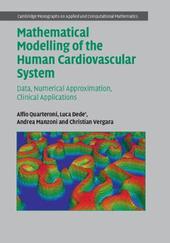
|
Mathematical Modelling of the Human Cardiovascular System: Data, Numerical Approximation, Clinical Applications
Hardback
Main Details
| Title |
Mathematical Modelling of the Human Cardiovascular System: Data, Numerical Approximation, Clinical Applications
|
| Authors and Contributors |
By (author) Alfio Quarteroni
|
|
By (author) Luca Dede'
|
|
By (author) Andrea Manzoni
|
|
By (author) Christian Vergara
|
| Series | Cambridge Monographs on Applied and Computational Mathematics |
|---|
| Physical Properties |
| Format:Hardback | | Pages:290 | | Dimensions(mm): Height 255,Width 181 |
|
| Category/Genre | Mathematical theory of computation |
|---|
| ISBN/Barcode |
9781108480390
|
| Classifications | Dewey:612.1015118 |
|---|
| Audience | | Professional & Vocational | |
|---|
| Illustrations |
Worked examples or Exercises; 4 Halftones, black and white; 39 Line drawings, unspecified; 3 Line drawings, black and white
|
|
Publishing Details |
| Publisher |
Cambridge University Press
|
| Imprint |
Cambridge University Press
|
| Publication Date |
9 May 2019 |
| Publication Country |
United Kingdom
|
Description
Mathematical and numerical modelling of the human cardiovascular system has attracted remarkable research interest due to its intrinsic mathematical difficulty and the increasing impact of cardiovascular diseases worldwide. This book addresses the two principal components of the cardiovascular system: arterial circulation and heart function. It systematically describes all aspects of the problem, stating the basic physical principles, analysing the associated mathematical models that comprise PDE and ODE systems, reviewing sound and efficient numerical methods for their approximation, and simulating both benchmark problems and clinically inspired problems. Mathematical modelling itself imposes tremendous challenges, due to the amazing complexity of the cardiovascular system and the need for computational methods that are stable, reliable and efficient. The final part is devoted to control and inverse problems, including parameter estimation, uncertainty quantification and the development of reduced-order models that are important when solving problems with high complexity, which would otherwise be out of reach.
Author Biography
Alfio Quarteroni is Professor of Numerical Analysis at Politecnico di Milano. He has authored twenty-five books and over 350 papers in international scientific journals and conference proceedings. He received many awards and honours in recognition of his work, and is a member of the Italian Academy of Science, the European Academy of Science and the Academia Europaea. His research interests include mathematical modelling and its applications. Luca Dede is Assistant Professor in Numerical Analysis at Politecnico di Milano. His research involves the development of efficient and accurate numerical methods for the approximation of partial differential equations, multiphysics and multiscale problems, and computational fluid dynamics. Andrea Manzoni is Assistant Professor in Numerical Analysis at Politecnico di Milano. His 2012 Ph.D. thesis won one of two ECCOMAS Awards for the best Ph.D. theses in Europe about Computational Methods in Applied Sciences and Engineering. His research interests include the development of reduced order modelling techniques for partial differential equations, uncertainty quantification, PDE-constrained optimization, and computational and statistical inverse problems. Christian Vergara is Associate Professor in Numerical Analysis at Politecnico di Milano. He works on the development of numerical methods for the cardiovascular system, in particular for the fluid-structure interaction problems and the electro-physiology of the ventricles. He has collaborated with hospitals and clinicians to use numerical and computational methods to address several problems of clinical interest.
Reviews'Overall, there is a nice interplay between the basic biology and physiology needed to understand the model, the pros and cons of different techniques of obtaining clinical data, and the implementation of the numerical methods. Each section includes beautifully colored schematic representations of the cardiovascular system ...' Sarah Patterson, Mathematical Association of America
|